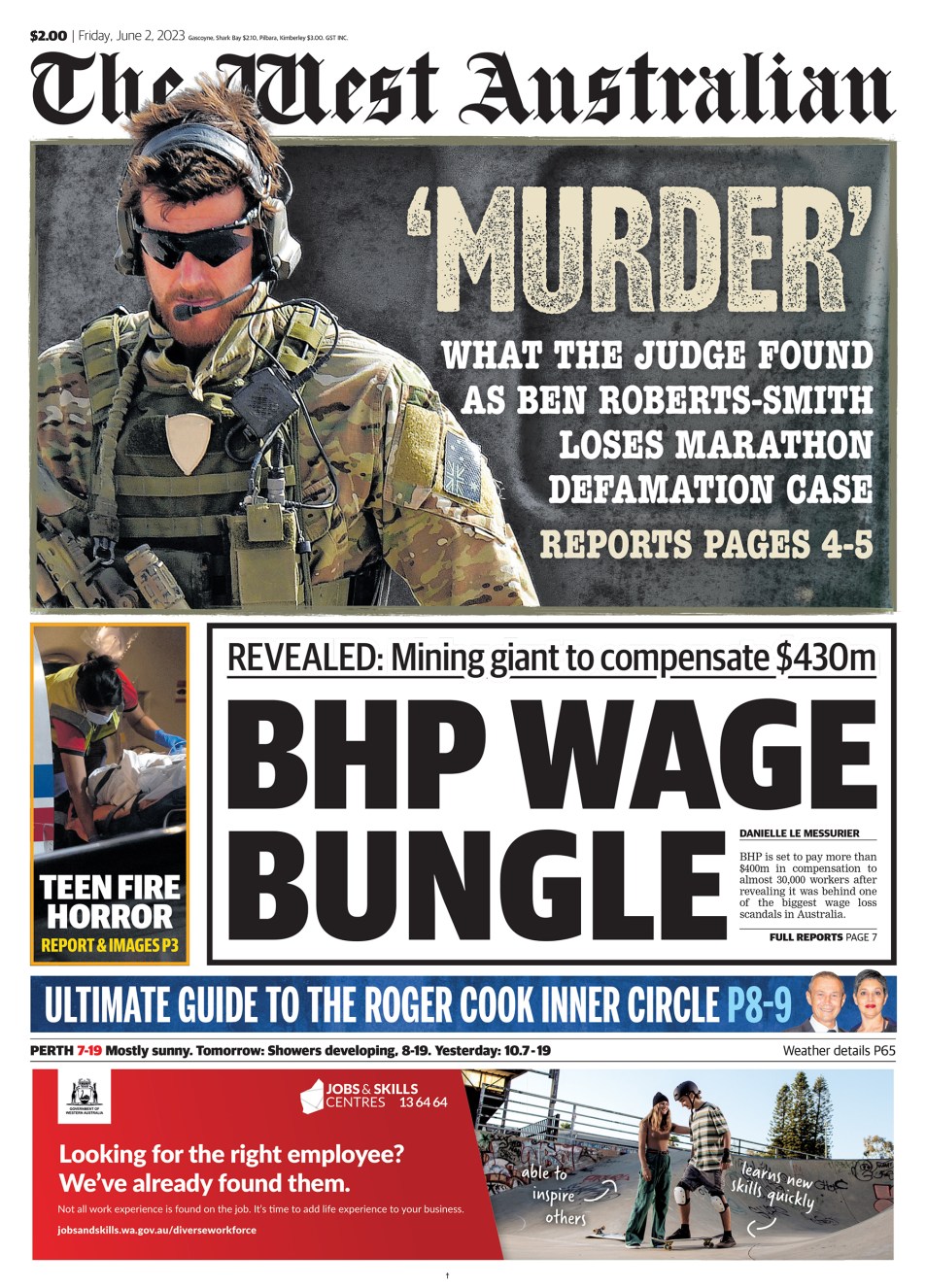
Yesterday, one of the most consequential defamation cases in Australian media history came to a close. One wonders how Ben Roberts-Smith, absent from court and spotted in Bali as recently as Wednesday, spent the afternoon as Justice Anthony Besanko found the 2018 reports alleging that he had committed a number of war crimes — published by The Age, The Sydney Morning Herald and The Canberra Times, who he then sued — were substantially true.
Given the testimony the case had brought about and the incredible details publicised, even had he won it would have been the very definition of a Pyrrhic victory. As it happens he lost, and lost and lost.
Here’s how the media reacted to a case that rippled through Australia’s media, made international headlines and interrogated our national myths.
The Nine papers
The Age and The Sydney Morning Herald staked huge resources, and in many ways their reputations as news outlets, on their reportage alleging Australia’s most decorated living soldier, a high-profile exemplar of a certain national ideal, was in fact a murderer and a war criminal. It is not the least bit surprising then that the mastheads greeted the decision with a sense of vindication and triumph:


In an editorial that pays tribute to the victims, the witnesses who came forward and the work of military sociologist Samantha Crompvoets, the SMH summed up:
This masthead you support has prevailed in defending itself against the charge of defamation, and the court has found that the man who brought those accusations, funded by a rival media company, in fact committed war crimes and murders. That Australian, who received the highest military decoration our country can bestow, whose words and actions became part of the fabric of the Australian War Memorial, has been shown to have committed those acts in a war waged on our behalf. And we should not forget that in a distant land, fathers and sons were cut down unjustly by foreign forces — our forces.
All that said, The Age may want to have a quick word with whoever controls their ad placements:

Given it was also named in the claim, it has to be said that The Canberra Times is remarkably chill about all this — a bit of commentary and a cartoon aside, the case barely registers on its homepage, where, at time of writing, this is the top story:

Other media
The Australian reported the decision relatively straight, with a strange focus on one of the imputations the judge found hadn’t been sufficiently supported by the evidence Nine presented: that Roberts-Smith had been violent towards a girlfriend.

Predictably there’s also a lot of “bigger picture” commentary in today’s edition, such as the following:
Many Australians will be more inclined to the view of one soldier who testified against Roberts-Smith but was nevertheless spittingly angry that a man he respected was being hounded for ‘killing bad dudes we went over there to kill’.
If Roberts-Smith had been content to let it go at that he’d still have half the country behind him.
Stephen Rice’s view, that mainstream Australia might have been largely tolerant of what was alleged against Roberts-Smith, is… interesting.
We also note that in describing Seven Network chairman Kerry Stokes, who bankrolled Roberts-Smith’s case against his media rivals at Nine, as “the country’s richest media mogul”, Rice tacitly acknowledges that the owner of his own masthead has gone out of his way to be un-Australian.
The West
It was always going to be interesting to see how the decision would be reported in the properties owned by Stokes. While every other outlet and network revelled in the drama of the decision and the case that led to it, Seven took a more restrained approach, in the process achieving the first recorded instance of anti-clickbait :

The West Australian was notably late to the story yesterday afternoon, and on its front-page piece today, it has used an image of Roberts-Smith that was photoshopped to blank out a badge displaying the Crusader’s cross:









I came across an unread copy of the Daily Tele in a cafe, which editorialised along the lines of ‘hey, bad things happen in war OK’. Gotta respect their audience. News Corp also clearly super jealous about Nine’s big win. Not really sure why, considering they don’t practise public interest journalism themselves
And mostly “crickets” from politicians of both sides.
A welcome change. It was politicians who got us into the messes that were the wars in Viet Nam, Afghanistan, Iraq.
Because, something, something… Anzac.
Crickets would be preferable to the PM’s soft-shoe shuffle & equivocation when asked directly on Friday.
How can anyone be so afraid of the Shadow of Moloch on such a clear matter?
I actually prefer the present PM’s soft-shoe shuffle to the outrage expressed by the present LOTO when he was Defence minister and the accusations of wrong doing by Australian troops in Afghanistan were first raised.
The judgement on Thursday was a in civil case and the PM and present Defence Minister do well to wait to see if there is an appeal and what other consequences may arise before rushing in as the present LOTO did.
There’s a vast difference between ‘soft shoe shuffle‘ and his normal M.O. of pre-emptive grovelling abasement.
Fantastic, Stephen Rice. He did not bash his mistress. In other news: allegations that Ted Bundy never separated recycling from general waste, are completely unfounded personal attacks.
Whaaaat? No way, I never realised just how degraded Bundy was! 😉
“…first recorded instance of anti-clickbait.” Love it!
The Establishment now has sufficient facial ova to keep a starving world in omelettes far into the foreseeable future.